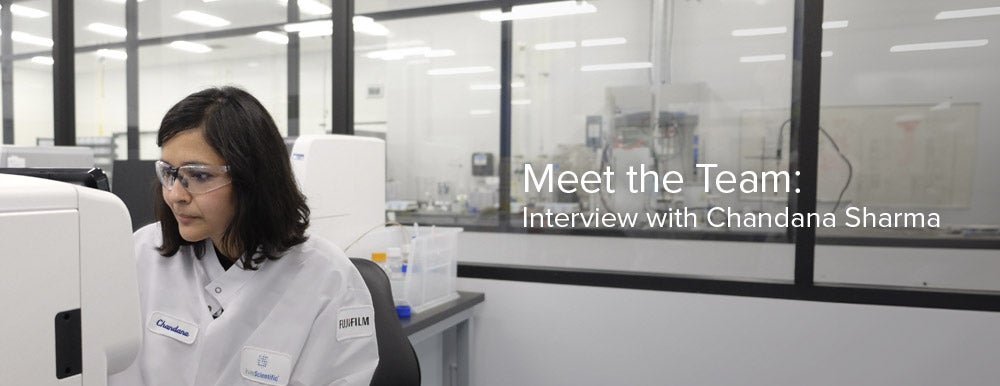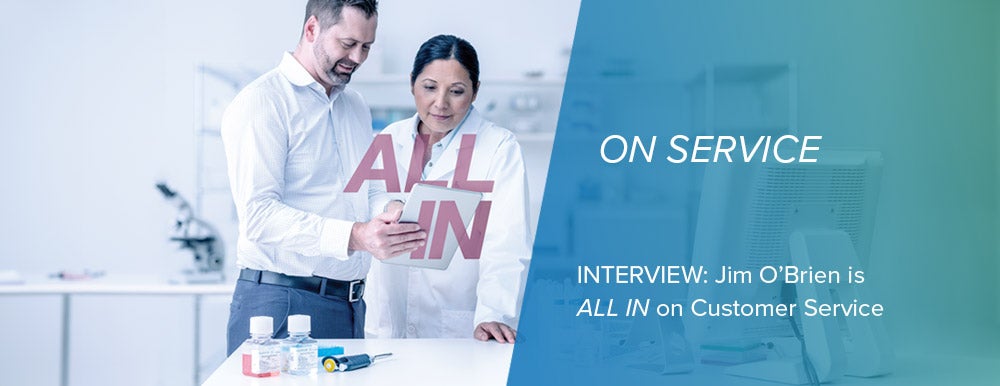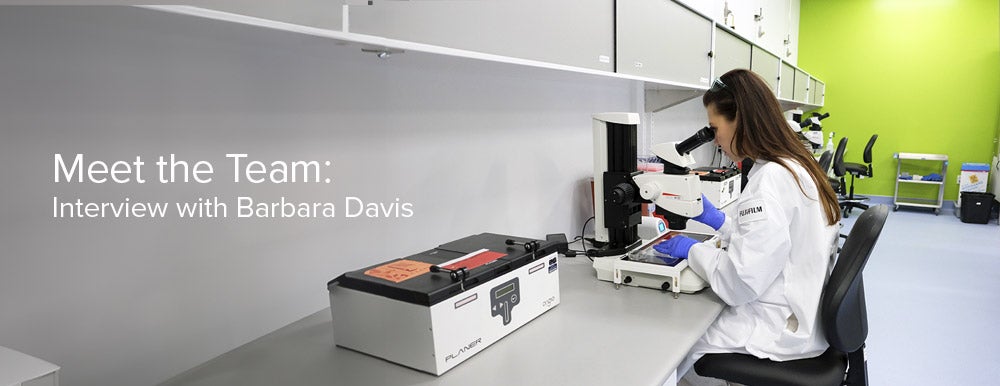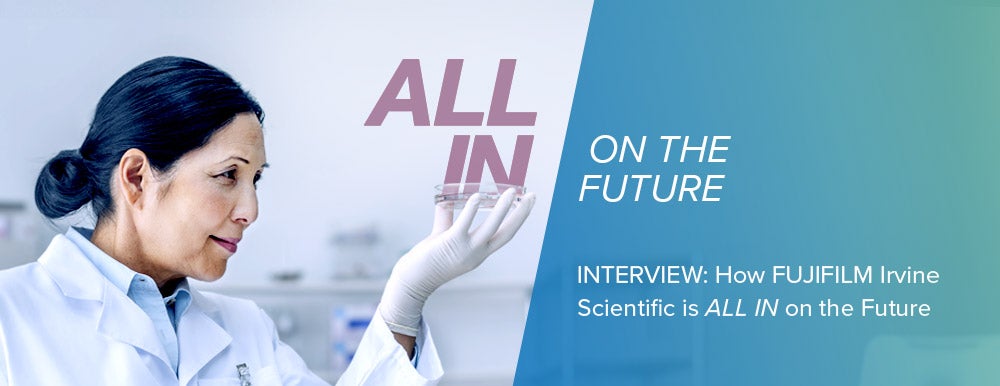We use cookies to make your experience better. To comply with the new e-Privacy directive, we need to ask for your consent to set the cookies. Learn more.
Meet the Team: Interview with Chandana Sharma, Senior Director, Life Sciences


When did you join FUJIFILM Irvine Scientific, and what attracted you to the company?
I joined FUJIFILM Irvine Scientific in July 2019 as Director of Research & Development (R&D). There were two main things that attracted me to the job, the first being the job itself. When I saw the job posting, it was perfect for my skillset and I knew I could make a difference in the role. It was a really good fit for where I was, in the same industry but with a slightly different focus. The other reason was the location. Before this job, I lived in Kansas City, which is right in the middle of the US. I was ready for a change, both in my job and in location, so we made the move to California!
What first ignited your interest in the life sciences? What is your professional and academic background that has led you to this role?
Before moving to the US, I studied for my Bachelor’s in chemistry at Delhi University and Master’s in chemistry, at the Indian Institute of Technology in Kanpur. I then went to grad school at the University of Arizona, where I got my PhD in medicinal chemistry.
When I was in grad school, even though I joined the chemistry department, my focus was in medicinal chemistry. I was making molecules, but I was making them to bind to DNA so that we could switch off an oncolytic gene involved in multiple cancers. This work was particularly pivotal in this stage of my scientific career as it demonstrated to me how important both chemistry and biology are to our sector and how each fits into its own space, but one cannot be complete without the other. I found the whole project so fascinating.
After grad school, I did my postdoc in protein purification before taking a job at Sigma Aldrich making cell culture media. I spent 11 years in that job, and it was like studying for a second PhD because you learn so much from the experience of working in a new area. From there, my career continued to evolve, moving into correlating the effects of individual cell culture media components to biological processes and ultimately to my career here at FUJIFILM Irvine Scientific.
What are the greatest accomplishments either yourself or your team have made, since joining the Company?
I’m really excited to say that since I joined the Company, my team has launched three different products, two of which are involved in making therapeutic antibodies using different platforms, and the other to make viral DNA for use in gene therapy.
I have been fortunate enough to watch the gene therapy team grow in front of my eyes. I hired very capable scientists who worked on projects that evolved into many different areas, ultimately leading to product launches which really complemented our existing product pipeline. All three products are now doing great and I’m really proud to say that we made it happen.
Another thing I’m proud of is that, when I first joined the Company, there was a limit to how far you could progress through the scientific career path without having a PhD. Myself, along with the management team, worked really hard with HR to remove this limit, because I believe that talented scientists should have no limits in what they can do. We can now say that we employ some really talented scientists, who for whatever reason weren’t able to go to grad school, but are able to use their talents to rise high up in their careers within the Company. There is no limit for them.
FUJIFILM Irvine Scientific offers a diverse portfolio of products and services through facilities across the globe. What benefits does this diversity offer?
At FUJIFILM Irvine Scientific, we look at ourselves as an entity who indirectly helps people. We don’t make the therapy and inject it into patients, but we support our customers in innovating and making those therapies. Having such a diverse portfolio means that there are more opportunities where we can help, for example our media was used in the COVID vaccines, and our products support patients and clinicians throughout the entire IVF workflow – it gives us a lot of satisfaction to know that we can help so many different people.
Operating from facilities across the globe is important as it gives us the benefit of speed. If we have to ship to Europe or Asia from the US, for example, that takes a lot of time. Being local allows us to provide our products to customers sooner, with less shipping costs, and environmentally more sustainable. It also lets us provide local customer support, to make sure our customers receive the best possible standard of service.
What trends have you noticed in the life science industry in the past few years, and how do you expect these to impact the industry in future?
The fundamentals of our industry do not really change. What changes is how quickly we can make a product and put it on a shelf, or how quickly we can learn and produce information. For example, back when I was a post-doc I had to do a lot of Western blots, which involved transferring gels onto a film and then developing that film in a dark room. Obviously, this took a lot of time. Nowadays, you can get technology to do that for you and it is amazing to see how the technology has evolved to the betterment of scientists. Automation is a huge and growing part of the industry - it’s something I can clearly witness the benefits of in our own lab.
Another important trend is machine learning. Within our R&D department, we have a team called Data Sciences, whose aim is to provide predictive insights before we carry out any actual experiments. If we have information on how to design an experiment to give us an optimal outcome, then we will have a much higher success rate, and this really has impacted our studies – giving us far fewer errors and greater success rates. AI and machine learning are both very important to data sciences and we, like many others, we are heavily invested in it.
Do you have any advice for other women in life sciences, having built a successful career as a leader in the field?
I would say the most important piece of advice is to always stay curious. Innate curiosity has to be there, it has to be a bigger force than anything else, and then everything else will eventually fall into place. We had the choice to study anything, and we chose science, so lets make sure we are asking questions and always learning.
I would also say it is important to say yes to opportunities. If someone asked me to do something, I would raise my hand and say ‘sign me up’, even if I didn’t necessarily know how to do it, I would figure it out. Sometimes you may wonder why you did it, but it really pushes you and it is so satisfying to know you can now do something that you couldn’t before. That is what pushed me through my career, I wasn’t chasing a job or a title, I wanted to do things that really challenged me, in whatever way possible.
Even now, I feel constantly challenged. As I’ve progressed in my career, my work has more to do with leading people than leading science. I can lead science no problem, but it is a completely different challenge to lead people. They have unique minds, and you can’t be predictive, or normalize it, like you can with science. When I was given my own team to lead, I took it as a challenge, even though I wasn’t so comfortable doing it. So that’s my advice really, always keep challenging yourself, asking questions and saying yes to opportunities.
Have you faced any challenges as a woman in STEM, and how have you overcame these?
I feel very lucky in that I don’t feel I have faced any challenges when it comes to educational or career opportunities. In fact, I got my first industry job when I was eight months pregnant! It was back in 2008, we were going through a recession and I didn’t really have high hopes for getting the job, but I was still very excited for the interview. I was very open from the offset, telling them I would not be able to join for at least five months and they not only offered me the job but they agreed to wait the five months for me to start – it was great to see that there were such good people out there.
Whilst I am thankful to say I have not faced challenges as a woman, what I do see is that in higher positions, executive level or higher management, there are fewer and fewer women. When I look at my department, we have so many female scientists in the lab, but there are a lot fewer when it comes to Director level or above, and I ask myself why? In my opinion, I think that women have a tendency to hold back. Even looking back at my own past, although I said I would take every opportunity, I found myself frequently questioning my own abilities, rather than believing in them. I think if we are confident in ourselves, we can overcome anything and achieve great things.
How do you think, as an industry, we can encourage more girls to pursue careers in science? How is FUJIFILM Irvine Scientific working to support this?
I think we can definitely do more as an industry. For example, one of the best things to do is to take science to schools. This is great for all children, girls and boys, just to get to see what science is and what is possible. I’ve been privileged in my life to go to schools and to work with the Girl Scouts of America to show kids loads of types of experiments.
One of the experiments involved DNA. Obviously, it is quite difficult to show human DNA, so we would use strawberries – which actually have 8 stranded DNA that you are able to see better with the naked eye. It was great to show them the cool things that science can explain, such as how these things are made up of living cells just like us and giving them a deeper connection just from seeing the DNA of a strawberry.
I’m pleased to say that FUJIFILM Irvine Scientific has a great internship program that we give a lot of support to. We make sure to offer a really diverse program, and grant these opportunities to both boys and girls, and it’s great to see some of these interns return to the Company to work. In fact, we have one scientist working with us now who was once a summer intern before continuing her education as a biomedical engineer. I was speaking to her recently and she said she never would have imagined herself working for FUJIFILM Irvine Scientific before, she never realized the depth of science behind developing media formulations. During her internship, she realized how important biomedical engineers were to supporting cell culture scale-up operations, particularly for understanding and managing the bioreactors which are obviously an essential part of large scale production. So yes, because of her internship, she returned to work here and she is really happy. It’s fantastic to see the impact that these programs can have.
With FUJIFILM Irvine Scientific, I’ve also been able to visit schools in rural north-eastern India, where I grew up. In my last visit there, I took some film and Instax cameras and taught them about light. It’s a great experience to do this, and to be able to give cameras to the schools as they are often very poor. It’s so much fun to see the kids playing with the Instax cameras, and seeing their excitement at watching the photos develop in front of their eyes. They go to a free school, and without this they would likely never have access to a camera, and it’s a really rewarding experience. You don’t have to go all the way to a rural school though, even if you just help your neighbor’s kid, show them the wonders of science and inspire their curiosity.
Stay tuned to meet more of our team! Please subscribe to our mailing list and follow us on LinkedIn.






